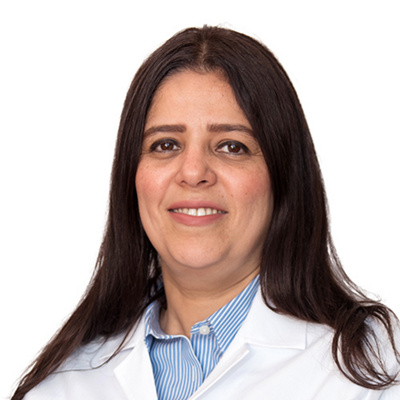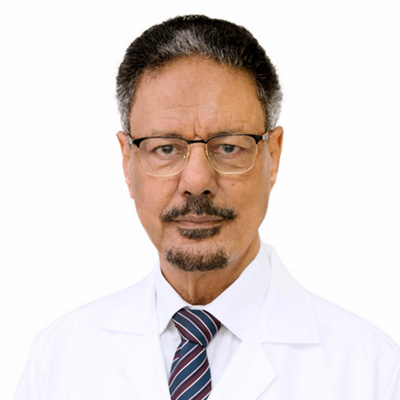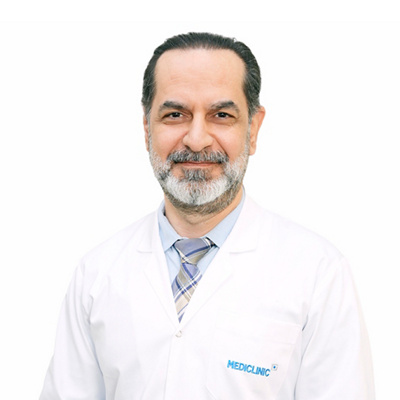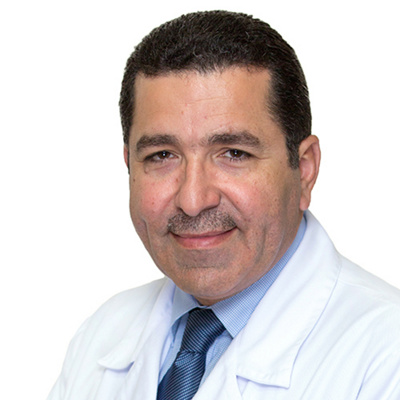The Neurology Department at Mediclinic Airport Road Hospital Abu Dhabi offers an appropriate team approach for nervous system care with comprehensive case management and the development of an individualised treatment plan. Neurology is the intricate study of the nervous system, encompassing the brain, spinal cord, and network of nerves that control every aspect of our body's functions. It delves into understanding the structure, function, and disorders associated with this complex system, offering insights into the mysteries of the human brain.
Our expert team at Mediclinic Airport Road Hospital’s Neurology Department is committed to providing the highest quality of healthcare services to patients with central and peripheral nervous system related disorders.
Services include:
Cerebrovascular pathology (stroke)
A cerebrovascular pathology refers to conditions affecting blood vessels supplying the brain. A stroke occurs when there is a disruption in blood flow to the brain, leading to brain cell damage or death. Ischemic strokes result from a blockage in a blood vessel, while haemorrhagic strokes occur due to a blood vessel rupture.
Symptoms: Sudden numbness or weakness in the face, arm, or leg, difficulty speaking, severe headache, vision problems, and loss of coordination.
Treatment: Immediate medical attention is crucial. Treatments may involve medication, surgery, or rehabilitation to restore lost function.
Epilepsy (adult and adolescent)
Epilepsy is a neurological disorder characterised by recurrent, unpredictable seizures. It can affect people of all ages, including adults and adolescents.
Symptoms: Seizures vary in type and intensity, from convulsions to staring spells or temporary confusion.
Treatment: Medications are often used to manage seizures. In some cases, surgery or other therapies may be considered for treatment-resistant epilepsy.
Headache (adult and adolescent)
Headaches are common and can be due to various causes, including tension, migraines, or underlying health conditions.
Symptoms: Pain or discomfort in the head or neck region, sensitivity to light or sound, nausea, and in severe cases, vision disturbances.
Treatment: Treatment varies based on the type of headache. It may include lifestyle changes, medications, stress management, or alternative therapies.
Movement disorders (tremors, Parkinson’s disease and apparent syndromes)
Movement disorders encompass conditions that affect movement control. Tremors involve involuntary rhythmic shaking, while a condition such as Parkinson’s disease is characterised by tremors, stiffness, and impaired movement.
Symptoms: Tremors, difficulty with voluntary movements, muscle stiffness, and in Parkinson’s, changes in gait and balance.
Treatment: Management involves medications, physical therapy, and in some cases, deep brain stimulation or surgery.
Peripheral nervous system disorders (polyneuropathies, myopathies, myasthenia, radiculopathies, plexopathies)
These disorders affect nerves outside the brain and the spinal cord:
- polyneuropathies involve damage to multiple nerves
- myopathies affect muscle tissue,
- myasthenia gravis affects nerve-to-muscle communication
- radiculopathies involve nerve root issues
- plexopathies affect nerve networks
Symptoms: These may vary widely but often include weakness, numbness, tingling, and pain in affected areas.
Treatment: Treatment varies based on the specific disorder and may include medications, physical therapy, or in severe cases, surgery.
Multiple sclerosis and other inflammatory disease of central nervous system
Multiple sclerosis (MS) is an autoimmune disease affecting the central nervous system, causing damage to the myelin sheath covering nerve fibres. Other inflammatory diseases similarly affect the CNS.
Symptoms: MS symptoms can include fatigue, numbness, coordination problems, and vision issues, among others.
Treatment: Medications aim to manage symptoms and modify disease progression. Rehabilitation and lifestyle changes are also important.
Dementia, Alzheimer’s disease and other cognitive disorders
Dementia refers to a decline in cognitive function affecting daily life. Alzheimer’s disease is the most common form of dementia, characterised by memory loss and cognitive decline.
Symptoms: Memory loss, confusion, difficulty with language or problem-solving, and personality changes.
Treatment: Management involves medications, cognitive therapy, lifestyle changes, and support for caregivers.
Sleep disorders and further sleep study
Sleep disorders encompass various conditions affecting sleep quality or patterns, including insomnia, sleep apnoea, narcolepsy, and restless legs syndrome.
Symptoms: These may vary depending on the specific disorder but often involve difficulty falling or staying asleep, excessive daytime sleepiness, or abnormal behaviours during sleep.
Treatment: Treatments range from lifestyle changes to medical interventions, such as CPAP (Continuous Positive Airway Pressure) for sleep apnoea.
EEG (awake and asleep) and further video EEG
Electroencephalogram (EEG) records electrical activity in the brain. Awake and asleep EEG capture brain waves during different states. Video EEG combines EEG with video monitoring to observe behaviour during seizures.
Purpose: Helps diagnose epilepsy, monitor brain activity, and evaluate sleep disorders.
EMG and nerve conduction study
Electromyography (EMG) measures muscle response or electrical activity in response to nerve stimulation. Nerve conduction studies measure the speed and strength of electrical signals traveling along nerves.
Purpose: Diagnose nerve or muscle disorders, identify nerve damage, or evaluate conditions like carpal tunnel syndrome.
Botulinum toxin (Botox) for migraine treatment, movement disorders and pain management
Botulinum toxin injections, commonly known as Botox, can be used therapeutically to treat various conditions, including chronic migraines, certain movement disorders like dystonia, and for managing muscle-related pain.
Purpose: Helps reduce muscle spasms, alleviate chronic migraine symptoms, and manage certain neurological conditions.
In essence, neurology is a vast and dynamic field that continually reveals the mysteries of the human nervous system. From unravelling the complexities of neurological disorders to embracing innovative treatments, neurology remains at the forefront of medical research and practice, offering hope for improved patient care and a deeper understanding of the most intricate organ in the human body—the brain.
Contact us today to learn more about our neurology services in Abu Dhabi.






